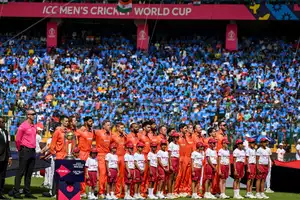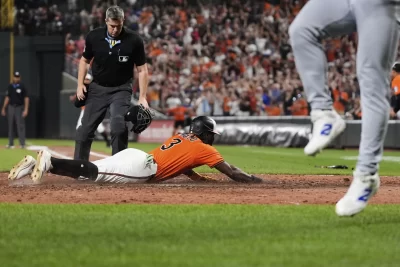
Thirteen balls short of the full 50 overs, Netherlands were bowled out on Sunday. Teja Nidamanuru, who had put to display his spin-bashing abilities enroute to an entertaining 39-ball 54, mistimed a slog to long on, handing Rohit Sharma his first wicket of the match and India their ninth victory of the tournament.
With two teams at the either end of the points table squaring off in the last match of the league phase, the eventual result was along predicted lines. The 160-run margin that eventually separated them notwithstanding, it was one of the better performances by a team against India in this tournament.
To give context to Netherlands’ performance on Sunday, only Afghanistan and Bangladesh had managed to bat out 50 overs against India, and none since Mohammed Shami joined and formed a relentless five-man attack. The several dropped catches and a combined 7.5 overs of bowling by the quartet of Virat Kohli, Shubman Gill, Suryakumar Yadav and Rohit Sharma would’ve helped their endeavor, even though they combined to strike twice.
For as experimental as India were with their bowling, they largely stuck to their intent of maintaining the intensity and momentum ahead of the knockouts, for which they went unchanged even in the inconsequential encounter.
For Netherlands, even in defeat and the gulf in the level at which they were playing as admitted by Teja Nidamanuru, it was about executing their skills for longer periods, a different show of character – one they intended to put on display at the global event, for the world outside, for the fans back home and for a recently-realised possibility of participating at the Olympics.
Even though they finished at the bottom of the table, having reached a peak of seventh position mid-way through the campaign, they won’t leave India as a completely disappointed team. Never before had Netherlands won two games in the 50-over World Cup. Never before had Netherlands beaten a Test-playing nation in the competition. The batch of 2023 have ticked off a few firsts.
Summing up the performance of his team in the tournament, skipper Scott Edwards said, “We played two good games of cricket, gave ourselves opportunities in other games which we’d have liked to win. Little bit of a tricky one to say where we were compared to where we wanted to be. We were pretty confident with the style we play. Coming into the tournament, we knew it’s going to be a tough tournament.”
The 2023 World Cup, in a way, provided Netherlands an opportunity to put those markers on their skill and performance levels, and understand for themselves where their cricket stands in the global scene. “The guys take valuable lessons away and the relationships that we’ve been able to develop have been really strong,” head coach Ryan Cook had said on Saturday. “I think we’ve also learned a lot of lessons around how we should prepare for these types of conditions. We came out to Bangalore twice, which was a great experience for us. And that was a sort of mind and eye-opening experience for everyone.
“If we’d had a few more games in the subcontinent, I think probably we would have come in a little bit better prepared. But nonetheless, we had what we had and the guys, as you say, have been putting in the full effort that they can every game that they play, every training session that they come to. So very proud as a coach in that regard.”
The World Cup became their chance to seize back what’s been lost – ample quality game time – with the scrapping of the ODI Super League. “The Super League was really influential for the players and they often refer back to those as reference points that they’ve had playing in different countries, playing against some of the top teams in the world,” Cook added. “And I think it’s probably one of the reasons why we sit in the position that we’re in today to be competing at the World Cup.
“The guys get about playing better opposition and obviously the more of those opposition we can play will be handy for us. I think we had a situation where after the qualifiers we had no cricket against any – we just had Karnataka that we played against. And probably in hindsight probably missed a couple of fixtures to refine our skills and get ourselves going in terms of quality fixtures that we had. And those two games were really good, but probably not quite enough for preparation for a World Cup like this. And that was no fault of our own. We tried our best to try and get as many fixtures as we could. But obviously, as we said, the schedules are quite packed.
“So, yeah, the (scrapping of the) Super League is obviously a blow for us, but again, nothing stopping a bilateral series happening between two countries in ODI cricket or in T20 cricket as we move towards the T20 World Cup as well. They will be up against the good teams again and obviously we’ll be trying to prepare as well as we can for that tournament.”
Coming into the World Cup, Netherlands didn’t get to play any official games after qualifying for the tournament. Both their warm-up matches were also washed out. Despite that, apart from the two wins, they also managed to put up strong performances against Pakistan and Sri Lanka for reasonable periods. There is a bit of cricket lined up, and there is no clarity as of now of how they will take the learnings and combine it with their future fixtures.
Shedding light on the near future and how they hope to develop as a one-day side, Teja – who also works in the Netherlands cricket board – explained their plans ahead. “There’s a T20 World Cup for which we have already qualified. So the attention goes to that a little bit more. But we’ve got the World Cricket League 2 starting in February, and we’ve got Nepal. These games are going to be crucial for us. So it’s going to be a combination.We’ve got to do a learning package of what we’ve got out of these last seven weeks and then still hold on to that while we look ahead.”
A day ahead of their final fixture at the 2023 World Cup, Cook had expressed hope that the performance of his team in the tournament would help take the sport forward in the country. “We hope that it does a lot. I think it’s the first time that it’s been streamed on TV for quite some time. It’s reaching a greater audience now and a lot more people are talking about it within the Netherlands. And lots of people are sending pictures and messages about having watch parties, there it’s a big thing.”
“It hopefully will grow the popularity of the game and provide aspiration for young players who want to come through the game and into the system, create a system that will be able to hold those players and get them to perform at international level. And that can only be good for us.
“Hopefully it also attracts fixtures like we’ve spoken about, more sponsorship and greater revenue into the game that we’ll be able to sort of put more resources in behind these group of players, but obviously players to come in the future as well.”
There’s a popular Dutch proverb, “Je weet nooit hoe en koe een haas vangt (You will never know how a cow catches a hare),” meaning – Never rule anything out, no matter how unlikely. Netherlands beat a rampaging South Africa in this tournament, much like they had beaten them in the previous T20 World Cup. Sandwiching that victory was a stunning 374-run chase against West Indies in the qualifiers to make it to the World Cup despite the absence of seven key players. They’ve taken their cricket forward certainly, but it remains to be seen how far this generation of Netherlands cricketers will be able to spin the fortunes of the sport in the country, and make the unlikely possible.






